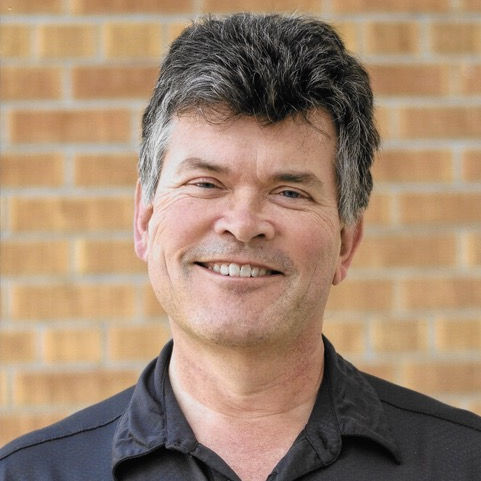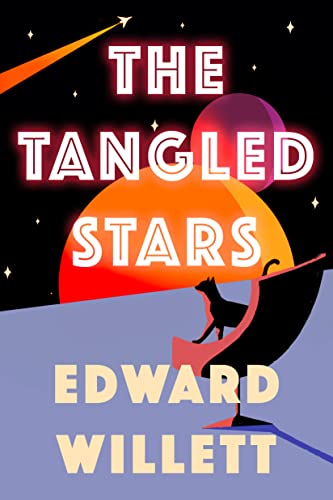How Edward Willett shapes his fantasy worlds

by Timothy Pike
Award-winning science fiction and fantasy author Edward Willett was a senior in high school when he wrote a novel called Slavers of Thok, which at the time he considered his magnum opus. “You could tell it was a serious fantasy novel,” he says, “because it had a map.”
While that statement is probably tongue-in-cheek, the novel itself was no joke—the culmination of many years spent sharpening his writing skills and reading everything he could get his hands on.
 In fact, Edward’s writing roots go back to a very early age—and quite a distance south of where he currently lives in Regina, Saskatchewan, Canada.
In fact, Edward’s writing roots go back to a very early age—and quite a distance south of where he currently lives in Regina, Saskatchewan, Canada.
“Like most writers, I began as a reader,” Edward says. “My kindergarten teacher in Lubbock, Texas, taught us the basics of phonics, and I taught myself to read from that. As a result, I skipped grade one—I already knew how to read. I read everything under the sun, but because I had two older brothers who read science fiction and fantasy, I gravitated toward that.”
Books & Buzz Magazine is where writing pros spill their secrets! Subscribe now for free
His interest in those genres was clear from the start. “I wrote my first complete short story when I was eleven years old, as something to do on a rainy afternoon with a friend,” Edward recounts. “In those pre-internet days, there wasn’t much else to do, and we only got two channels on TV, one of which was fuzzy. I don’t know if my friend finished his, but I finished mine, entitled ‘Kastra Glazz: Hypership Test Pilot,’ which shows you where my mind was right from the very beginning.”
“I shared my stories with my classmates and discovered I could tell stories people enjoyed,” Edward says. “And somewhere along in there, I decided I wanted to be a writer.”
Throughout his schooling, Edward continued to hone his craft. “In high school, my best friend, John Smith—no, really—also liked writing,” he says, “and we used to meet in an empty classroom after school and write, then read to each other what we’d written, alternating sentences, to sometimes hilarious effect. I wrote a novella-length science fiction story in those sessions.”
The other students at his school, as he soon found out, loved what he wrote. “I shared my stories with my classmates and discovered I could tell stories people enjoyed,” he says. “And somewhere along in there, I decided I wanted to be a writer.”
But even though he had the talent—and quite a bit of material to show for it—Edward was aware of how tough the writing business could be when starting out. “I knew, because I read Writer’s Digest, that you couldn’t make a living as a writer right away,” he says. “And so I went into journalism, because I figured at least I’d be writing and getting paid.”
After completing his studies at Harding University in Arkansas, his career took off. “I graduated in December of 1979 with a degree in journalism, and in January 1980 began working as a reporter-photographer for the Weyburn Review, the weekly newspaper. By 1984, at the ripe old age of twenty-five, I was the news editor.”
Despite his success in that field, Edward found himself yearning to strike out on his own—and that’s when he made an interesting discovery. “I always wanted to be a full-time freelance writer,” he tells me, “but once I quit my job in 1993 and plunged into being exactly that, I discovered, as someone actually warned me at the time, that when you rely on freelance writing as your main source of income, counterintuitively, it can have a negative impact on your writing—or at least the writing that you most long to spend time on. The constant pressure to write something, edit something, or publish something to make money draws you away from the pure joy of writing the novel you want to be writing now, or a short story, or a play, or whatever.”
“I wanted to write outer-space adventure, I wanted it to be humorous, and I knew I wanted a wisecracking talking cat in it,” Edward says about his latest novel, The Tangled Stars.
After several years of non-fiction writing projects, Edward made his foray into fiction with his debut novel, Soulworm, a young adult fantasy that was published in 1997 and became a finalist for Best First Novel at the Saskatchewan Book Awards. Then, a few years later, he went on to win a Saskatchewan Book Award for Spirit Singer.
With that award under his belt, Edward’s new career as a fiction author quickly gathered momentum. “In 2005,” he says, “Lost in Translation, a science fiction novel I’d written, was picked up for a mass-market paperback edition by DAW Books. I’ve been a DAW author ever since.”
Typically, Edward will pitch new novel ideas to his publisher, then let the stories unfold on their own once he starts writing. “For DAW, I sell novels on the basis of a synopsis, so I definitely start with a premise,” he says, “which I then develop into a fairly detailed synopsis, which I then use as the basis of the final book—although I usually only look at the synopsis if something goes awry in the writing, and the final book is usually noticeably different than I originally imagined.”
The premise of Edward’s latest novel, The Tangled Stars, for example, sprang out of a desire to combine science fiction, adventure, humor, and a cat. “I wanted to write outer-space adventure, I wanted it to be humorous, and I knew I wanted a wisecracking talking cat in it,” he says. “From those seeds, plus a good dash of watching The Expanse, I think, grew The Tangled Stars.”
In one way or another, Edward is involved in just about every phase of bringing books to market. “In addition to writing,” he says, “I do freelance editing, and I’m also a publisher. In 2018, I founded my own publishing company, Shadowpaw Press. There are currently more than twenty-five Shadowpaw Press titles, and I’ll probably publish a dozen more at least in 2023.”
Over time, Edward found he could use his clout as a publisher to help other writers. “I got into publishing because I had some of my own titles to re-release,” he says, “but I’ve discovered I really enjoy the process and helping other authors get their titles into the literary marketplace. But there’s no question it cuts heavily into my own writing time. I’m trying to figure out how to balance the two.”
His involvement in the performing arts also figures in to that balancing act. “Those who know me as a writer,” Edward says, “may not know that I am also a professional actor and singer who has performed in dozens of plays, musicals, and operas, both professionally and just for fun.”
In addition, he hosts an award-winning podcast that features interviews with other prominent science fiction and fantasy authors.
Looking down the road at his next published book, Edward is still weighing his options. “I don’t know what my next novel will be,” he admits. “I’m pitching a sequel to The Tangled Stars and a few other things to DAW, but nothing is contracted yet. On the non-fiction side, I’m writing a book about the creative process drawing from my more than 120 interviews with other science fiction and fantasy authors on my Aurora Award–winning podcast, The Worldshapers. So if you want a teaser, go listen to the podcast!”
Edward Willett is the award-winning author of more than sixty books of science fiction, fantasy, and non-fiction for readers of all ages, and hosts The Worldshapers podcast, which features interviews with science fiction and fantasy authors about their creative processes. Edward runs his own publishing company, Shadowpaw Press, and is also a professional actor and singer who has performed in dozens of plays, musicals and operas in and around his hometown of Regina, Saskatchewan.
You can visit Edward at his website, and connect with him on Facebook, Instagram, and Twitter.